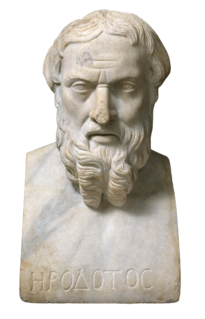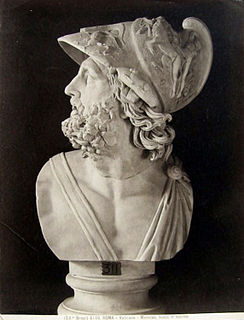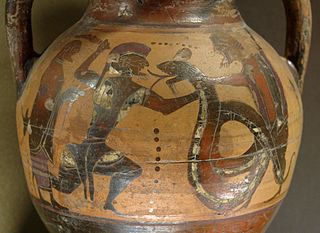Related Research Articles

Apollo is one of the Olympian deities in classical Greek and Roman religion and Greek and Roman mythology. The national divinity of the Greeks, Apollo has been recognized as a god of archery, music and dance, truth and prophecy, healing and diseases, the Sun and light, poetry, and more. One of the most important and complex of the Greek gods, he is the son of Zeus and Leto, and the twin brother of Artemis, goddess of the hunt. Seen as the most beautiful god and the ideal of the kouros, Apollo is considered to be the most Greek of all the gods. Apollo is known in Greek-influenced Etruscan mythology as Apulu.

Cyprus, officially called the Republic of Cyprus, is an island nation in the eastern Mediterranean Sea. It is the third largest and third most populous island in the Mediterranean, and is located south of Turkey; west of Syria; northwest of Lebanon, Israel and the Gaza Strip; north of Egypt; and southeast of Greece. Nicosia is the country's capital and largest city.

Herodotus was an ancient Greek writer, geographer and historian born in the Greek city of Halicarnassus, part of the Persian Empire. He is known for having written the Histories – a detailed account of the Greco-Persian Wars. Herodotus was the first writer to do systematic investigation of historical events. He is referred to as "The Father of History", a title conferred on him by the ancient Roman orator Cicero.

Homer was the reputed author of the Iliad and the Odyssey, the two epic poems that are the foundational works of ancient Greek literature. He is regarded as one of the greatest and most influential writers of all time.

Heraclitus of Ephesus was an Ancient Greek, pre-Socratic, Ionian philosopher and a native of the city of Ephesus, which was then part of the Persian Empire.

Poseidon was one of the Twelve Olympians in ancient Greek religion and myth, god of the sea, storms, earthquakes and horses. In pre-Olympian Bronze Age Greece, he was venerated as a chief deity at Pylos and Thebes. He had also the cult title "earth shaker". In the myths of isolated Arcadia he is related with Demeter and Persephone and he was venerated as a horse, however it seems that he was originally a god of the waters. He is often regarded as the tamer or father of horses, and with a strike of his trident, he created springs which are related with the word horse. His Roman equivalent is Neptune.

The Ptolemaic dynasty, the Thirty-third dynasty of Egypt, sometimes referred to as the Lagid dynasty, was a Macedonian Greek royal dynasty which ruled the Ptolemaic Kingdom in Ancient Egypt during the Hellenistic period. Their rule lasted for 275 years, from 305 to 30 BC. The Ptolemaic was the last dynasty of ancient Egypt.

In Greek mythology, Menelaus was a king of Mycenaean (pre-Dorian) Sparta. According to the Iliad, Menelaus was a central figure in the Trojan War, leading the Spartan contingent of the Greek army, under his elder brother Agamemnon, king of Mycenae. Prominent in both the Iliad and Odyssey, Menelaus was also popular in Greek vase painting and Greek tragedy, the latter more as a hero of the Trojan War than as a member of the doomed House of Atreus.

Philip II of Macedon was the king (basileus) of the kingdom of Macedon from 359 BC until his assassination in 336 BC. He was a member of the Argead dynasty of Macedonian kings, the third son of King Amyntas III of Macedon, and father of Alexander the Great and Philip III. The rise of Macedon, its conquest and political consolidation of most of Classical Greece during the reign of Philip II was achieved in part by his reformation of the Ancient Macedonian army, establishing the Macedonian phalanx that proved critical in securing victories on the battlefield. After defeating the Greek city-states of Athens and Thebes at the Battle of Chaeronea in 338 BC, Philip II led the effort to establish a federation of Greek states known as the League of Corinth, with him as the elected hegemon and commander-in-chief of Greece for a planned invasion of the Achaemenid Empire of Persia. However, his assassination by a royal bodyguard, Pausanias of Orestis, led to the immediate succession of his son Alexander, who would go on to invade the Achaemenid Empire in his father's stead.

In ancient Greek religion and mythology, the twelve Olympians are the major deities of the Greek pantheon, commonly considered to be Zeus, Hera, Poseidon, Demeter, Athena, Apollo, Artemis, Ares, Hephaestus, Aphrodite, Hermes, and either Hestia or Dionysus. They were called Olympians because, according to tradition, they resided on Mount Olympus.
In mathematics, an element of a set is any one of the distinct objects that belong to that set.

The Indo-Greek Kingdom, or Graeco-Indian Kingdom, also known historically as the Yavana Kingdom (Yavanarajya), was a Hellenistic-era Greek kingdom covering various parts of Afghanistan and the northwest regions of the Indian subcontinent, which existed during the last two centuries BC and was ruled by over 30 kings, Menander, being the most illustrious and successful.

Filiki Eteria or Society of Friends was a secret organization founded in 1814 in Odessa, whose purpose was to overthrow the Ottoman rule of Greece and establish an independent Greek state. Society members were mainly young Phanariot Greeks from Constantinople and the Russian Empire, local political and military leaders from the Greek mainland and islands, as well as several Orthodox Christian leaders from other nations that were under Hellenic influence, such as Karađorđe from Serbia, Tudor Vladimirescu from Romania, and Arvanite military commanders. One of its leaders was the prominent Phanariote Prince Alexander Ypsilantis. The Society initiated the Greek War of Independence in the spring of 1821.
Epaphroditus is a New Testament figure appearing as an envoy of the Philippian church to assist the Apostle Paul. He is regarded as a saint of the Orthodox Church and the Catholic Church, first Bishop of Philippi, and of Andriaca, and first Bishop of Terracina, Italy. There is little evidence that these were all the same man.

Vasilis Kikilias is a Greek politician who currently serves as Minister for Tourism in the Cabinet of Kyriakos Mitsotakis. He is a member of the Hellenic Parliament for New Democracy in the Athens A constituency. He is also a retired professional basketball player who played for Panionios B.C., Ionikos Nikaias B.C., AEK B.C., Apollon Patras B.C. and the Greek national team.
Aera! Aera! Aera! is a 1972 Greek feature film directed by Kostas Andritsos, starring Yannis Voglis and Xenia Kalogeropoulou. The plot concerns the opening phase of the Greco-Italian War in October/November 1940, with the protagonists caught up in the Italian invasion of Greece from Albania. The film belongs to a series if "patriotic" films shot during the Greek military junta of 1967–74. Its title derives from the popular Greek war cry of the time, "Aera!".

Panargiakos Football Club is a Greek football club based in Argos, Greece. The association was founded in 1926. The club is a founder member of the Argolida Football Clubs Association.
L (Learning) is a Greek movie produced in 2011, directed by Babis Makridis, written by Babis Makridis and Efthymis Filippou, based on an original idea by Yorgos Giokas. It was the first Greek movie selected to compete at the 2012 Sundance Film Festival where its international premiere took place. The movie was also nominated to compete in the official Tiger Awards competition in the International Film Festival Rotterdam where its European premiere took place.The film was nominated for Best Script award at the Hellenic Film Academy Awards. A six-minute extract of the movie was first released at the Work Progress Section of the Karlovy Vary International Film Festival, at the Czech Republic in July 2011. L is Makridis's first feature film. His short film The Last Fakir (2005) was awarded the Newcomer's Prize at the 2005 International Short Film Festival in Drama which takes place in Greece.